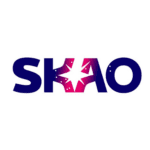At the SKAO we are coordinating a global effort to deliver the next generation of radio telescopes. Headquartered in the UK, with telescope sites in Australia and South Africa, the SKAO will be one observatory operating two telescopes, an endeavour spanning three continents. The SKAO became an intergovernmental organisation in 2021.
The two facilities cover different frequency ranges: SKA-Mid (350 – 15400 MHz) will be an array of dish antennas located in South Africa, while SKA-Mid (50 – 350 MHz) will use aperture array technology and will be constructed in Australia on Wajarri Yamaji country.
Construction activities for the SKAO’s telescopes started in 2021, along with a ramping up of SKAO staff in Australia and South Africa. The first interferometric test observations with SKA-Mid are expected in 2025. It is expected that the transition from the Construction Phase to the Operations Phase will happen around 2030.
SKAO Operations in South Africa will be conducted in partnership with the South African Radio Astronomy Observatory (SARAO). The Observatory will also partner closely with a global network of SKA Regional Centres through which astronomers will access science data products and a suite of tools and resources to further analyse the SKA telescopes’ data.
SKA-Mid is being built in the Karoo region of the Northern Cape. For more information on the SKA project visit https://www.skao.int/
Job Location: Cape Town, South Africa
Area / Department: Science
Contract Type: Fixed Term Contract
Salary: Commensurate with the SKAO level 7&8 pay structure depending on experience, plus excellent benefits
Closing Date: 18/01/2026
Ref No: 10365
The Role
This is a unique opportunity for talented and motivated radio astronomers to play major roles in the scientific commissioning of SKA-Mid, the world’s largest mid-frequency radio telescope.
Appointees will take responsibility for specific technical areas, working under the direction of the Lead Commissioning Scientist, who will act as their functional and line manager.
These roles are based in Cape Town, South Africa.
There will be a requirement for international travel, particularly to the SKAO Headquarters at Jodrell Bank. There will also be a requirement for occasional travel to the SKAO Engineering Operations Centre in Klerefontein, and to the telescope site.
SKAO is committed to providing an inclusive and flexible working environment, meeting the requests of our Colleagues whilst also fulfilling the needs and objectives of the Observatory. We are open to discussing flexible working opportunities with these roles being offered on a full-time, part-time or job share basis. Please raise your preference in your application.
This role requires the post holder to work across different time zones and, in line with SKAO policy, flexible working hours will be supported in agreement with the line manager.
Research and Career Progression:
These are fixed-term positions, initially for a period of 4 years but with a potential for extension depending on the
SKA-Mid construction schedule. The postholders will have the opportunity to apply for permanent positions in Science Operations as these become available. Secondment or leave of absence from the postholder’s current institution for the duration of the construction phase may also be possible, subject to negotiation.
The appointees will be encouraged to carry out research in astronomy or astronomical instrumentation at a level commensurate with the requirements of the post and in particular to exploit early opportunities with the SKA. Appropriate support, including conference travel, will be provided.
Key Responsibilities, Accountabilities and Duties
The SKAO is seeking to appoint skilled and motivated radio astronomers to plan and execute the scientific commissioning of the SKA-Mid array. The postholders will join a small group of commissioning astronomers based in Cape Town, South Africa. The primary tasks of the group are:
- Take responsibility for science commissioning, e. planning, execution and analysis of test observations on the array. The group will work closely with the System Science Group based at GHQ (Jodrell Bank), which has oversight of commissioning of both SKA-Mid and SKA-Low.
- Close collaboration with engineering (hardware and software) groups involved in construction to verify aspects of the system and to identify and correct faults. There will be a particularly close interaction with the Assembly, Integration and Verification (AIV) Group, also based in Cape Town.
- Support the AIV group to verify the top-level engineering requirements of the
- Maintain a close interaction with the Science Operations Group, in particular to support Science
There may also be opportunities to work with SARAO and MPIfR on the commissioning of Extended MeerKAT, which will eventually be integrated with SKA-Mid.
Senior members of the group are already in post. Currently two additional positions are available, with common requirements, as follows.
Mandatory Knowledge, Skills and Experience
The appointees will be active radio astronomers with the following qualifications:
- A PhD (or equivalent) in astronomy or physics, with substantial experience in observational radio
- A strong understanding of radio astronomical techniques and demonstrated ability to reduce and interpret data from radio telescopes.
- A good understanding of the science enabled by the
- Experience of working in one or more of the construction, commissioning or operation of a radio
- Demonstrated experience of working in a small team, contributing constructively to an inclusive and high performing team culture.
Desirable Knowledge, Skills and Experience
- A proven track record in commissioning of radio telescopes (hardware or software), including test, scripting and debugging experience, and a demonstrable ability to analyse complex, system-level problems.
- A background in mid-frequency interferometry and/or non-imaging (beam-forming) applications such as pulsar search and timing.
- Experience of remote working with teams across multiple time
- Proficiency in written documentation, particularly test and problem
At the SKAO we are coordinating a global effort to deliver one of the largest science facilities on the planet. The SKAO telescopes will be next-generation instruments that will help to answer key questions in astrophysics, drive technological innovation and support human capital development.
More than a dozen partner countries and over a thousand scientists and engineers around the world are already on board, making the SKA project an international collaboration like no other, and one of the most ambitious science and engineering endeavours of the 21st century.
Headquartered in the UK, with telescope sites in Australia and South Africa, the SKAO will be one observatory operating two telescopes, an endeavour spanning three continents. Multinational by design, in early 2021 the SKAO became an intergovernmental organisation, one of only a select handful of science infrastructures to do so worldwide.
Construction activities for the SKAO’s telescopes in Australia and South Africa started in 2021, along with a ramping up of SKAO staff in both countries. It is expected that the transition from the Construction Phase to the Operations Phase will happen around 2028.
SKAO Operations in South Africa will be conducted in partnership with the South African Radio Astronomy Observatory (SARAO). SKAO Operations in Australia will be conducted in partnership with the Commonwealth Scientific and Industrial Research Organisation (CSIRO). The Observatory will also partner closely with a global network of SKA Regional Centres through which astronomers will access science data products and a suite of tools and resources to further analyse the SKA telescopes’ data.
For more information on the SKA project visit https://www.skao.int/
The SKA Observatory offers a competitive salary and a generous pension and benefits package. As an employee of an intergovernmental organisation, an appointee who is not a national of the country in which the role is based may be subject to personal Privileges and Immunities.
Equality Diversity and Inclusion Statement
SKA Observatory recognises that our diversity is a strength. We aim to create a welcoming and inclusive environment where everyone feels they belong, and diverse perspectives and ideas thrive. As such, Equality, Diversity, and Inclusion are at the core of SKA Observatory’s agenda.
Our aim is to recruit and retain the most talented individuals, regardless of gender, race, disability, age, sexual orientation, marital status, religion, nationality or background.
Women have traditionally been under-represented in the fields of science and engineering; SKA Observatory welcomes and encourages female applicants.
Where applicants with a disability need facilities or adjustments to enable them to participate in the recruitment process, these will be provided.
SKA Observatory welcome all candidates, especially those from member countries.
How to Apply; information contained within the SKA Observatory recruitment portal provides more detail regarding our application and selection approach.



